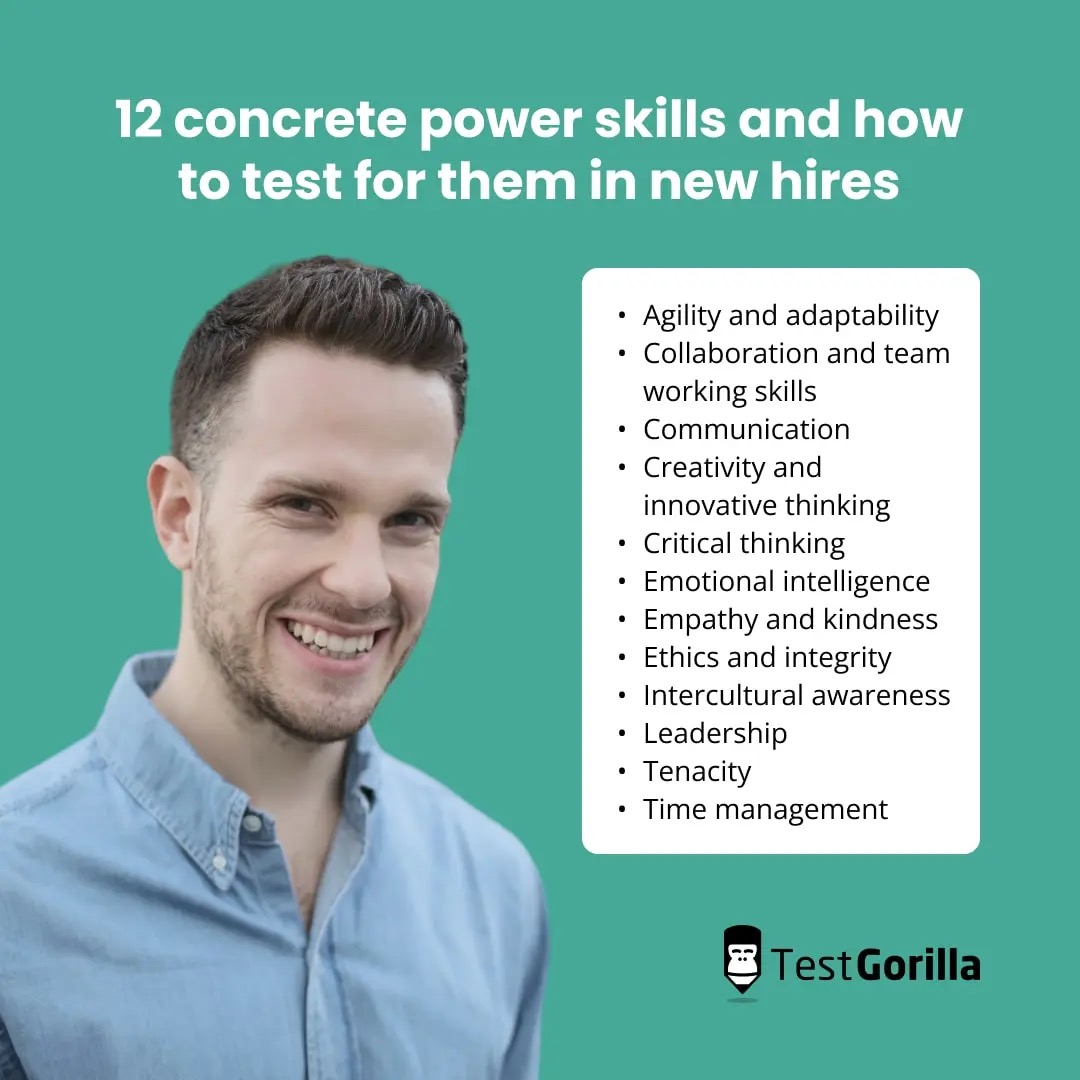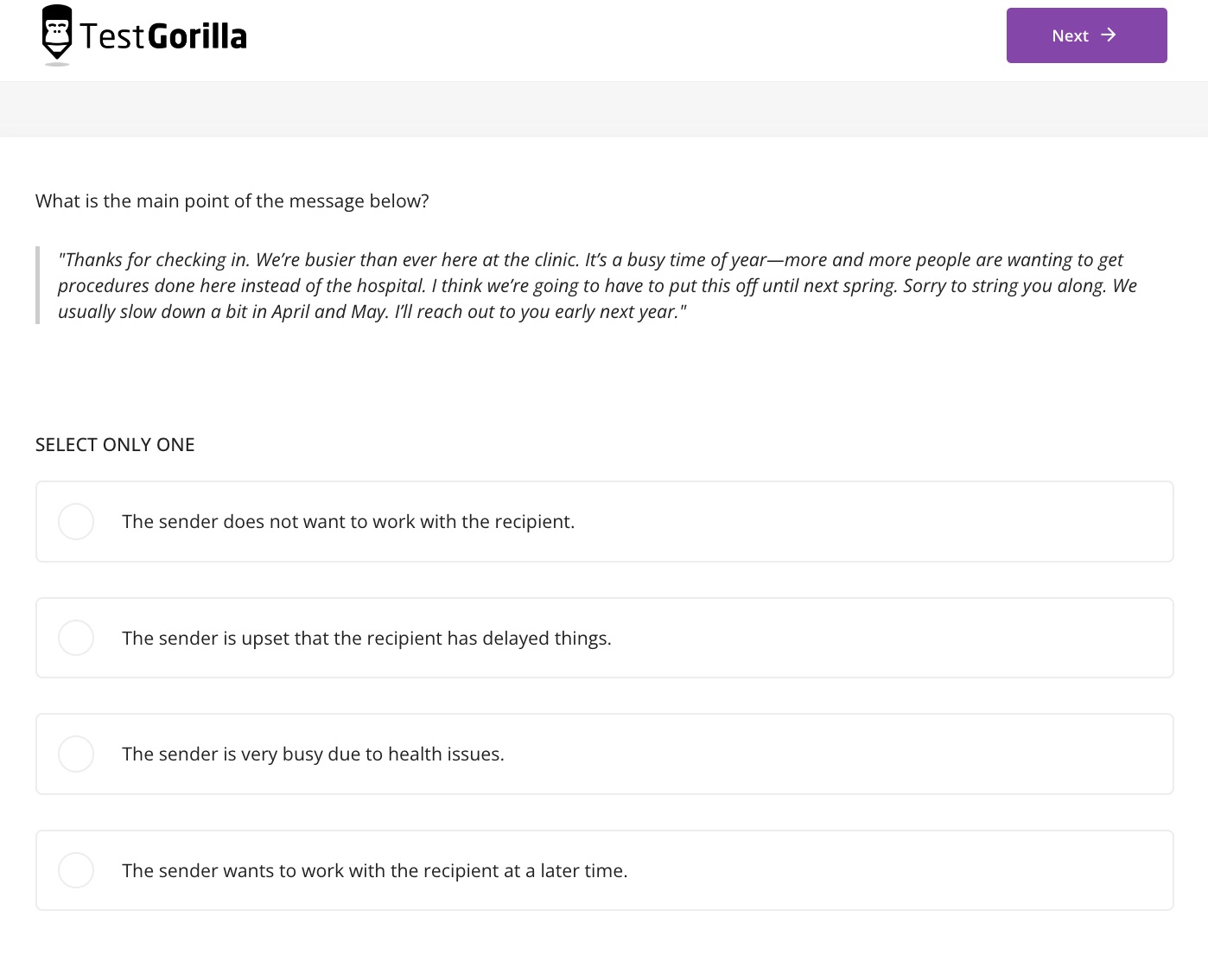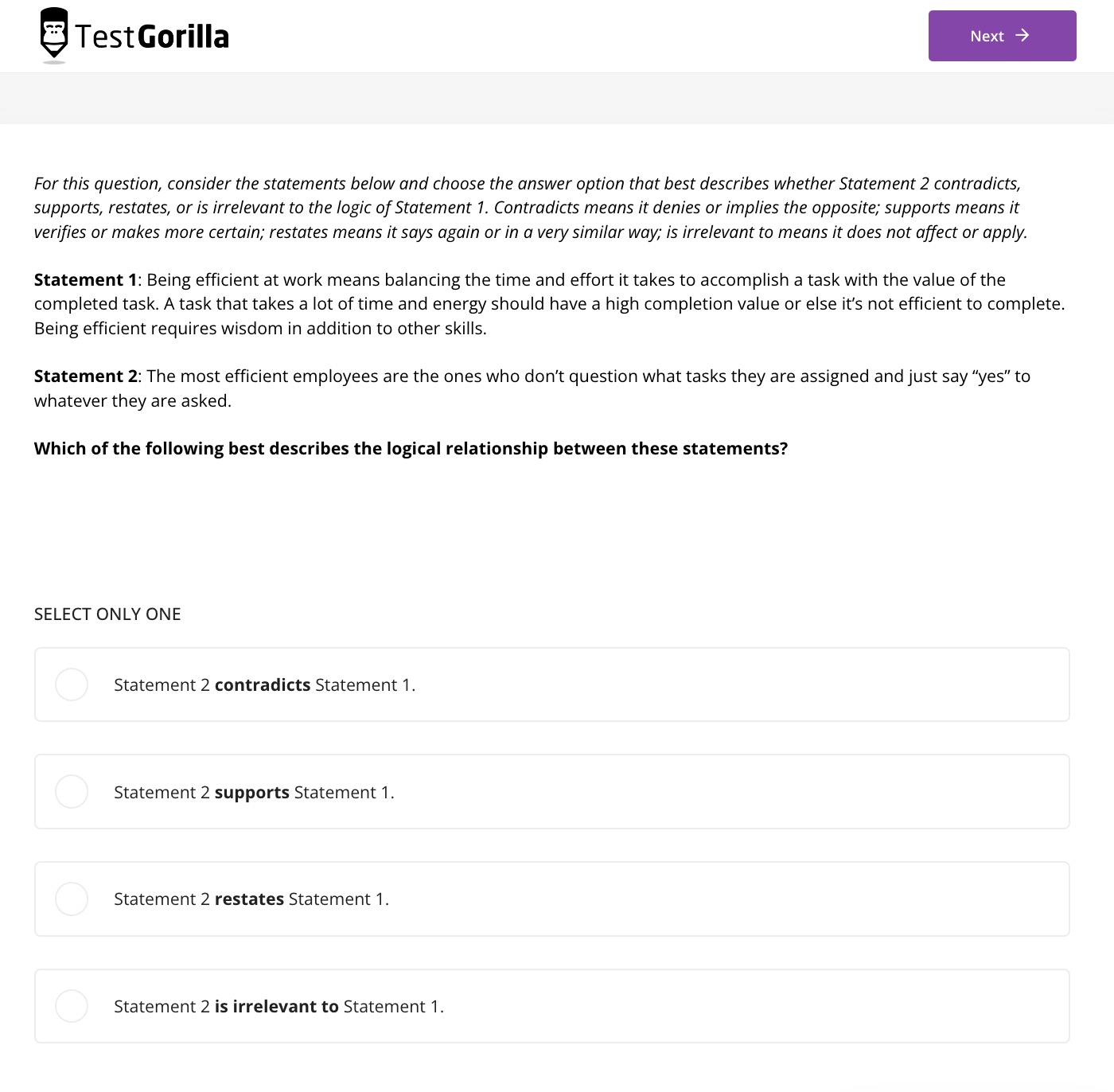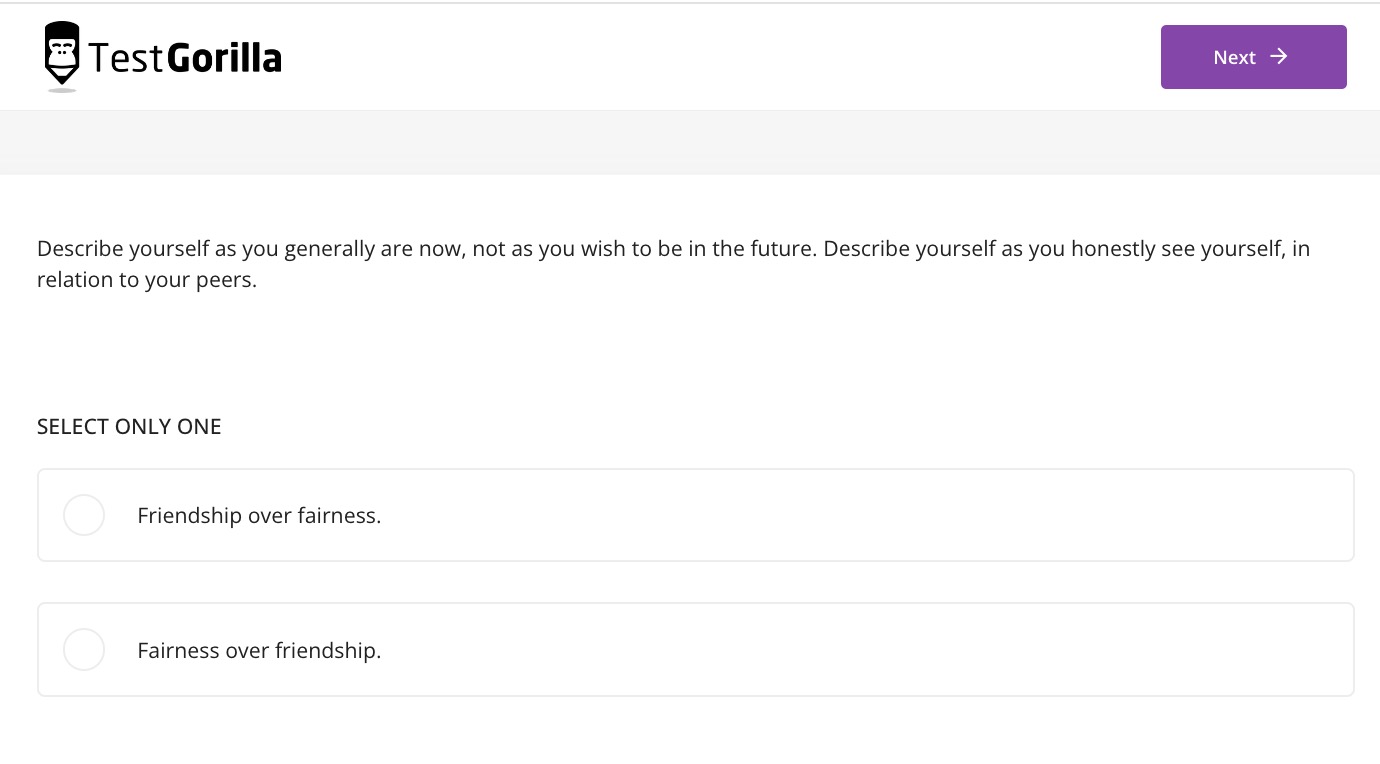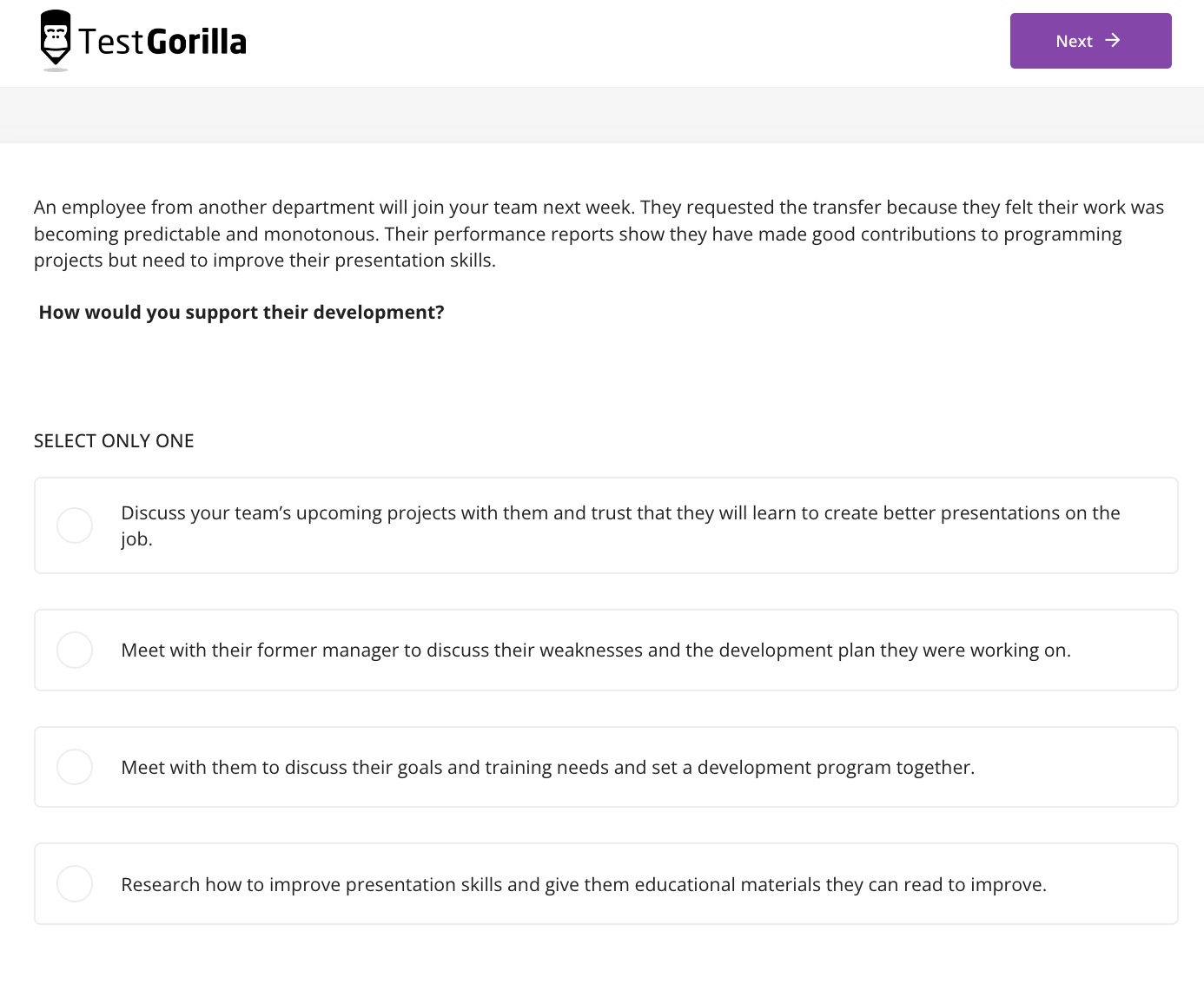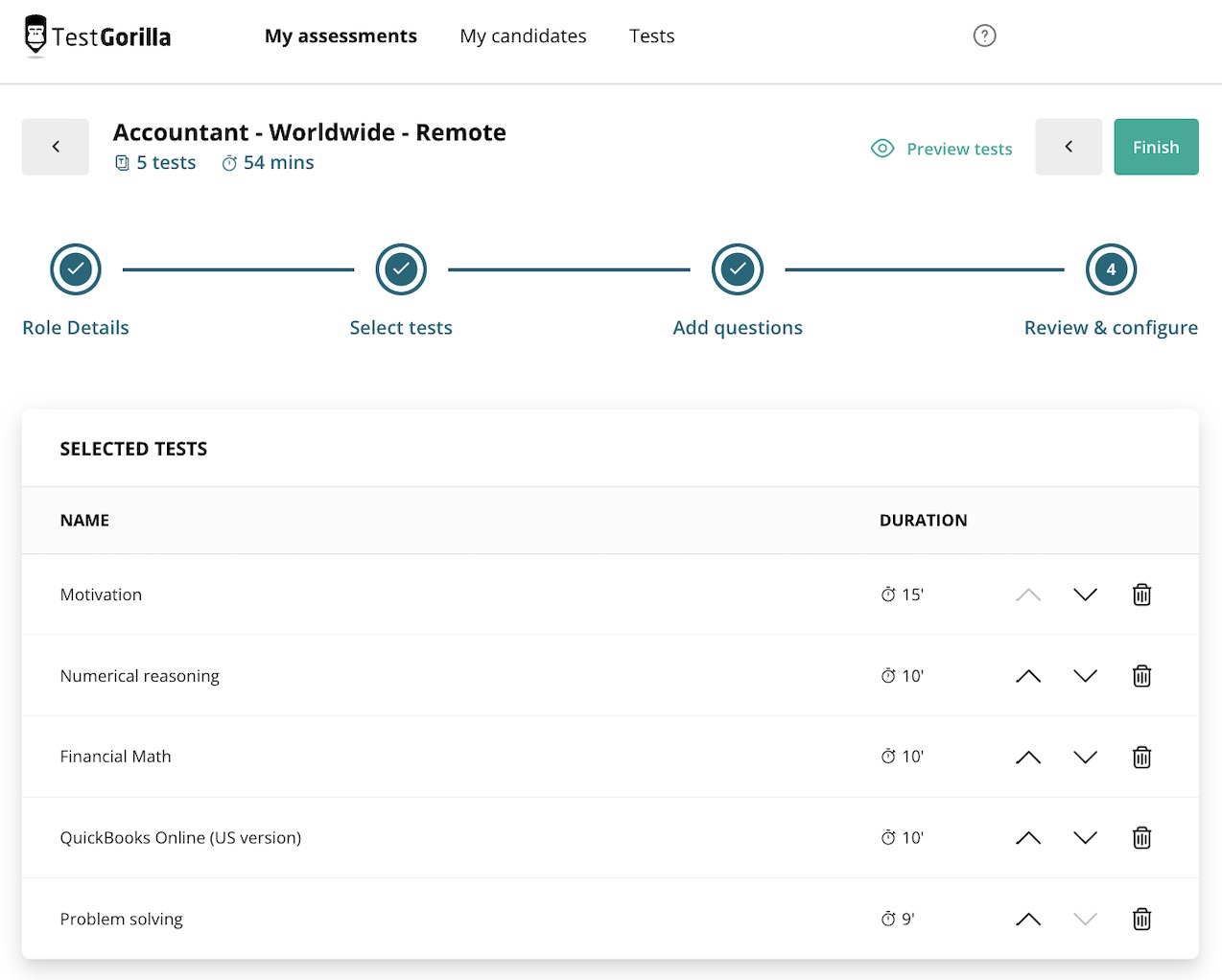You’ve hired an expert who’s proactive and experienced – what if it turns out they’re a poor team player? Or what if you hire a manager with strong technical competencies who struggles to empower their team?
Chances are you're relying too much on technical or "hard" skills and not enough on power skills – such as:
Empathy
Creativity
Collaboration
Leadership
Organization
By focusing on power skills, you hire and develop resilient and reliable contributors who genuinely care about what they do and the results they help to produce.
Read on to explore some power skills examples and learn how talent assessments help you find motivated, adaptable, and creative experts.
What are power skills?
Power skills are soft skills. They’re non-technical, personal qualities such as trainability, communication, emotional intelligence, and creativity. These social and emotional power skills help complement technically capable people. People with technical and power skills inspire their colleagues, look for creative answers to complex problems, and are dependable in high-stress situations.
People started replacing the “soft” with “power” because of the immense value these skills held. This new power skills definition is fitting, given employers’ demand for emotional or power skills is projected to increase by 26% by 2030.
The importance of power skills in the workplace
You should prioritize power skills training and hiring in your workplace for many important reasons:
Your leaders and staff work better together – managers with strong power skills actively listen to the needs of their teams and help them solve problems
You produce a more agile and adaptable workforce, reacting quicker to unexpected changes
Collaboration and teamwork become easier across different departments
Problem-solving becomes proactive, and employees keep supervisors well-informed about progress
Your teams look at complex problems from different angles
It’s easier to present a human face to customers who demand a personable experience
The best insights on HR and recruitment, delivered to your inbox.
Biweekly updates. No spam. Unsubscribe any time.
12 top power skills and how to test for them
Testing for power skills in new hires helps you build empowered, enthusiastic teams from scratch.
Your skills-based hiring approach should still include technical assessments, but the more “powerful” your hires are, the quicker you start reaping the rewards.
Power skills examples: In summary
What are power skills in practice? Here are 12 of the most important “power” skills employers look for:
Adaptability: Being ready to change roles and responsibilities at short notice
Collaboration: Working with others to reach shared goals
Communication: Sharing ideas and concerns with clarity and confidence, active listening skills
Creativity: Innovating and going against the grain to succeed
Critical thinking: Solving problems objectively without bias or outside influence
Emotional intelligence: Managing and balancing emotions to navigate challenges and support others
Empathy and kindness: Connecting with others and their problems, demonstrating “human” understanding
Ethics and integrity: Acting honestly and morally, remaining accountable
Intercultural awareness: Working with people and respecting others without cultural bias or prejudice
Leadership: Inspiring and encouraging others to reach their full potential
Tenacity: Staying resilient and focused on goals despite setbacks and challenges
Time management: Handling personal workloads and meeting internal deadlines without sacrificing quality
Let’s explore these power skills examples in a little more detail.
Test for these power skills
Test for these power skills and more with a free forever account by TestGorilla.
1. Adaptability
Adaptability and agility show an employee thrives with changing problems, scenarios, teams, and timescales.
They are willing to try new things, change their job profile quickly, and join projects without pushback. They’re positive, think on their feet, and actively listen to feedback.
How to test for this skill
Use a personality test, such as the 16 Types exam, to measure your applicants’ processing abilities, decision-making attitude, and motivation.
Then, measure curiosity, resilience, and resourcefulness with pointed interview questions about previous projects in which they excelled.
For instance, you could ask an applicant about an occasion when they needed to make a snap decision and the steps they took to find a resolution. You could also ask if they’ve ever changed projects or teams at short notice and how they adapted.
2. Collaboration
Collaboration skills show an applicant “works well with others.” Collaborative people enjoy working in teams and give space for others to have their say.
They understand they’re one piece of a larger puzzle. They’re highly proactive and enthusiastic about working with different people for long periods.
Collaborative workplaces handle multiple complex projects at once, with balanced approaches using varying technical skill sets and experience.
How to test for this skill
Use personality tests to measure an applicant’s potential dominance in team settings and conscientiousness when working with others.
Consider using TestGorilla’s Culture Add test to measure how an applicant aligns with your team setup.
This test is completely customizable around your company’s needs and values – book a 30-minute demo with us to see it in action.
3. Communication
Effective communication means presenting ideas clearly and professionally while actively listening to others and taking their feedback on board.
This power skill removes the need for guesswork between team members and supervisors and prevents misunderstandings.
How to test for this skill
To start, ask hires about how they’ve previously approached conflict management. Can they, for example, explain how they communicated with someone to ensure deadlines were met despite a high demand for resources?
Then, run a Communication test to measure their people skills in different scenarios. This TestGorilla talent assessment measures how effectively candidates interpret written messages:
It also judges how effectively they handle specific workplace situations, such as resolving personal conflicts.
For more sample questions, check out our mock Communication test.
4. Creativity
In a workplace setting, creative thinking is the ability to produce new ideas to help solve existing problems.
Creative employees ask questions, work with others to solve problems, and respectfully challenge existing processes.
They look for new ways to answer questions, pay attention to minute details, and confidently explore more efficient, cost-effective, and results-driven options.
How to test for this skill
You could create role-play environments for applicants and watch how they approach everyday problems in your workplace.
Here are a few examples:
Role play scenario | Summary |
They’re handling an angry customer who is threatening to close their account | Explore how the candidate communicates with the customer and creatively looks for ways to resolve their issues |
They’re working with two other specialists on a project that’s running short of time | Note how the candidate works with others and if they can work creatively and prioritize resources under pressure |
They’re debugging software that’s crashing when it opens | Let the candidate explore different ways of editing and testing code, using different tools, and bringing in outside expertise |
During hiring, you could also offer a simple problem-solving test to explore how hires respond creatively to complex scenarios.
5. Critical thinking
Thinking critically means doing so without outside influence, such as emotions, other opinions, and bias.
Critical thinkers are efficient, focused problem solvers. They approach scenarios with open minds and only deal with the facts. These thinkers are confident and unfazed, often producing interesting answers and perspectives, communicating openly with others without bias.
That means companies get high-quality products and services without outside disruption.
How to test for this skill
Ask your applicants to describe how they approached problems without having the full facts and how they’d approach errors left by supervisors.
Then, use TestGorilla’s Critical Thinking test to help candidates show deductive reasoning and how they interpret complex or incomplete information.
For example, the test could ask applicants to carefully read two or three statements and decide whether they support or contradict each other:
This is one of the most in-depth tests in our library – take a look at some more preview questions to get a taste of what’s in store.
6. Emotional intelligence
An emotionally intelligent employee manages and uses their emotions to support others.
People with high EQ are infectiously positive and proactive. They’re inspiring and engaging leaders, connect well with others, and possess excellent self-awareness.
They’re assets in high-pressure environments because they manage their emotions and stress effectively to focus on finding objective resolutions.
What’s more, a Lee Hecht Harrison Penna survey found that up to 57% of managers claim their best-performing staff have high EQs.
How to test for this skill
Ask interviewees to show how they manage stressful workloads in specific situations and how they’ve approached potential ethical dilemmas.
You could create customer service role plays and observe how they handle obstructive or problematic users. Then, test their negotiation skills and how they communicate with others.
7. Empathy
Empathetic people relate easily to others without judgment, bias, or desire for personal gain.
They’re patient and willing to listen to others’ viewpoints before making snap decisions, and they find it easy to relate to customers and end users with complex problems.
They inspire positivity and proactivity without letting emotions slow progress or end quality. Empathetic leaders go a long way toward maintaining their employees’ wellbeing in the modern workplace.
How to test for this skill
You could start by using personality tests such as the nine-point Enneagram test to find out how your candidates approach problems and work with others.
This test asks candidates to honestly describe and explore their personalities with simple questions. For instance:
Personality tests such as these generally help you get to know applicants better before you hire them. This was a major plus point for Digital Care, who partnered with TestGorilla to improve its quality of hire and save money on mis-hiring.
8. Ethics and integrity
People with strong ethics communicate honestly, remain accountable for their actions, and make decisions based on what is “right.”
Employees driven by ethics and integrity are highly reliable and learn from their mistakes. They react positively to feedback and communicate openly without agendas or personal bias – they make great leaders because they treat everyone with the same respect and honesty, regardless of role and/or seniority.
Before measuring this skill, understand that employee integrity testing is sometimes controversial because some applicants are dishonest. Ethics testing doesn’t necessarily account for someone’s future actions.
How to test for this skill
It’s wise to balance business ethics and compliance tests with personality and motivation tests and to measure suitability for your team with culture add analysis.
Given that some employees can answer dishonestly, you should balance these tests with probing interview questions.
You could ask:
When did you last make a mistake, and how did you fix it?
When did you last break the rules at work, and what actions did you take afterward?
When did you last go the extra mile for a project?
9. Intercultural awareness
Intercultural awareness is an objective understanding of and appreciation for cultures other than one’s own. People who show intercultural awareness work with other people without bias or prejudice.
Workplaces are becoming increasingly multicultural, particularly as companies continue growing through remote and hybrid working across different continents.
However, workplace discrimination continues to ravage US businesses, and employees feel increasingly pessimistic about diversity at work, making it an important factor to focus on.
How to test for this skill
Using various test and interview scenarios, monitor how applicants adjust their communication and/or working styles with people from different backgrounds.
You can also use culture add testing to measure how applicants align with your international team’s profile and ethos.
10. Leadership
Leaders motivate, support, and encourage others. However, leadership is more than “being inspirational” or “pulling rank.” It’s the art of positively influencing others to reach their goals.
Effective leaders bring out the best in their team members. They help to motivate collaborations, boost employee morale, increase confidence, inspire trust, and encourage innovative thinking.
How to test for this skill
Start measuring this power skill using a tailored Leadership and People Management test to find applicants who genuinely want to bring out the best in people.
This test asks applicants to explore how they’d motivate people who need to develop essential skills:
Then, test for emotional intelligence and empathy and create potential scenarios where they’d need to give disciplinary support and/or coaching.
Beyond power skills testing, you could also design creative pre-recruitment tasks, such as producing sample personal development plans.
11. Tenacity
Tenacious people “keep going” in the face of increasing challenges without letting emotion or personal bias interfere.
Tenacity is a great motivator, and it’s desirable in leadership candidates. However, although positive, it’s important to balance tenacity with empathy, open communication, and a healthy perspective.
Healthy tenacity is an attitude to continue pushing towards success by working with others and monitoring progress, not working to the point of burnout.
How to test for this skill
Measure emotional stability and agreeableness through the Big 5 (OCEAN) test. This test asks candidates to grade their behavior on a sliding scale between one and five and judges people on their conscientiousness, openness, and extroversion.
Then, carefully measure communication skills through written and verbal tests and use the Business Judgment test to check how well applicants work under pressure.
12. Time management
People with great time management skills self-manage workloads and deadlines and ensure they attend to all projects with the same determination and effort.
Time management skills demonstrate that applicants are reliable people to delegate to, in-house or remotely.
Thanks to the growth of remote work and freelance culture, more people are working autonomously on projects away from the company office. As such, companies must entrust staff to manage their deadlines and produce quality results on their own time.
How to test for this skill
Provide applicants pre-hiring assignments with deadlines or checkpoints, measuring quality output and schedule adherence.
Then, use a tailored Time Management test to measure applicant attitudes to schedules and their flexibility for solo project management.
Power skills training tips to help you get the best out of your workforce
Even if you’re not hiring right now, learning how to train power skills is great for turbocharging your existing team and preparing for future recruitment drives. After all, your workforce might have some hidden talents.
To start, proactively plan around power skills. Map out ideal interpersonal skills for individual roles, teams, and projects.
Ask big questions of your business. What skills do you prioritize or value most of all for growth?
Break down your employee attributes, experience, and aptitudes, and measure them with skills testing to identify training needs.
Plan for future skill gaps with talent mapping – where are the biggest vulnerabilities in your organization?
You can build assessments through TestGorilla’s free forever account to measure multiple role skills at once. Here’s how you could test for a remote accountant, for example:
Next, look for opportunities to transfer talent from one area to another that needs more support. Investing time and money in existing personnel is more cost-effective than onboarding a new team member.
From here, focus on building a culture of honesty that prioritizes learning and development. Here’s a quick rundown on how to get started:
How to build power skills | Summary |
Incorporate open-door policies | - Let employees speak honestly about areas they feel they need more help with - Discuss what team members would like to achieve in the long term - Talk about the new skills your employees want to develop |
- Help employees achieve their personal goals - Work with your managers to build targeted power skills development in your company through something like a mentoring program - Appeal to 34% of personnel looking for more learning and development opportunities | |
Roll out 1:1 coaching plans | - Speak directly with employees and learn more about what they need - Identify potential areas for development, i.e., through power skills training - Test learners with exercises to measure and coach their skills, customized to individual goals |
You should also think carefully about future managers, too.
Creating a training culture focused on human skills and bolstered by a healthy variety of leadership opportunities helps to boost employee retention. What’s more, developing leadership skills in the workplace provides you with a wider pool of potential talent to choose from in-house.
Although you should be open to hiring leaders, upskilling and developing from within is efficient and easy to manage after a talent gap analysis.
Personalize your power skills testing
Get a free forever plan and train your team with personalized power skills testing!
Power skills = plugged-in personnel
What are people with power skills? They’re more than just “soft” skills. They’re human qualities businesses need to succeed in the modern age.
Hiring on technical skills and experience alone only takes you so far. You need engaging leaders, reliable team players, and creative communicators.
Investing in power skills training for your team and testing skills in new hires:
Fosters a positive, supportive work environment
Helps you retain exceptional talent
Presents an appealing, human face to customers and clients
Makes you more attractive to future talent you wish to hire
However, to assess and train power skills, you need an equally powerful skills testing process. That’s where TestGorilla comes in – and you can learn how to build your own tests with our product tour.
If you prefer, we can give you a personal, hands-on skills testing demo to suit your specific power skill needs.
When you’re ready to start testing, simply sign up for a Free Forever plan to get up and running in minutes.
Power Skill FAQs
You’ve read through our power skills examples – now, let’s answer some common questions.
What are power skills vs soft skills?
Power skills are soft skills. It’s a modern term that describes the importance of personal qualities and human instinct in technical roles. Experts argue that the term power skills reflects how difficult it is to build these attributes. The debate around power skills vs soft skills arose because some argue the word “soft” diminishes their importance and role in work and personal development.
What are power skills vs hard skills?
Power skills are unique, transferable, and personal qualities that help you perform well at your job, while hard skills are technical abilities you can learn to perform specific tasks. For instance, the above power skills definition covers communicating effectively, thinking critically, and showing empathy. Hard skills, meanwhile, include field-specific talents such as language skills, accountancy, and programming.
What are examples of power skills?
Showing empathy and kindness
Managing conflict
Negotiating with others
Leadership
Collaboration
Communicating with different people
Showing integrity
Creative problem solving
Thinking critically
Our guide explores a longer list of critical yet often underrated power skills and benefits you can reap for your business.
What are the top 3 power skills?
Communication, collaboration, and empathy are three of the most valuable power skills you can hire for and train. These help people connect easier to others, their company’s culture, and the projects they’re working on.
You've scrolled this far
Why not try TestGorilla for free, and see what happens when you put skills first.


